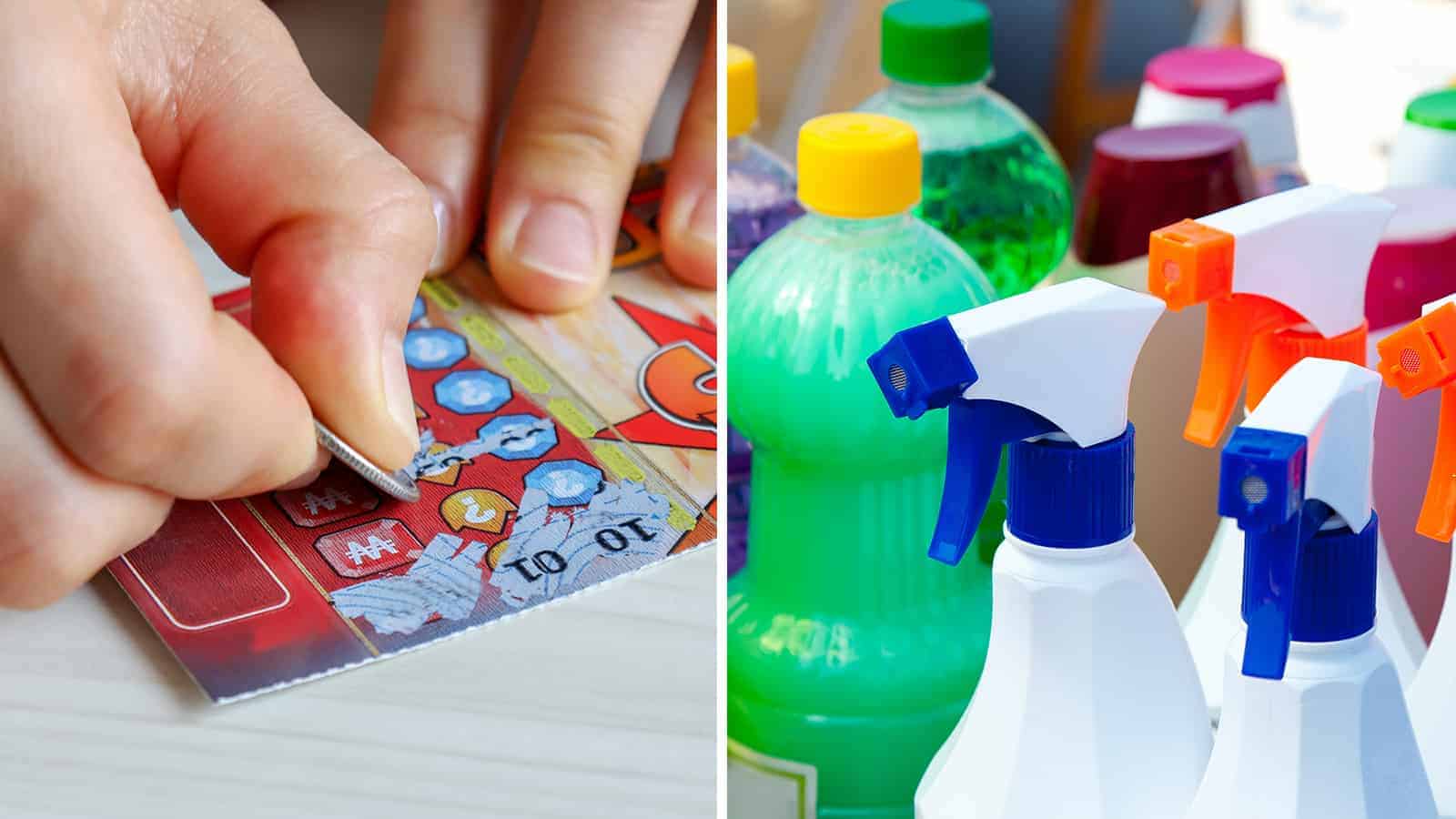Everyone’s looking for better ways to save and spend money, but that’s not always an easy task! With the way the world works, hidden charges and unexpected financial necessities always pop up, even when you’re trying to put your cash to more positive uses.
It’s tough to know what you can cut back on and where you’re unknowingly overspending. To help you out, here are 4 things you should never spend money on and tips to save more money in four handy ways.
4 Things You Should Never Spend Money On
Are you wasting money without realizing it?
 1. Don’t Spend Money on Excess Food
1. Don’t Spend Money on Excess Food
In the United States, a whopping 30-40% of all produced food winds up going to waste, according to statistics from the United States Department of Agriculture. This is a significant amount! Admittedly, a fair bit of this comes from restaurants and other businesses, but households contribute to it. And when you’re trying to save money, even a little excess food can add up.
There are many ways aside from food waste, though, that may be a sign that you’re spending too much on excess food. Here are some ways that you’re doing this:
· Shopping For Groceries When Hungry
When your stomach is rumbling, you’re more likely to want to scoop up anything that looks yummy at the grocery store. Even if you have a meal plan and a well-written grocery list, you may be tempted to buy that little extra snack or decide to make a last-minute meal addition that you don’t need.
· Shopping For Groceries When You’re Very Free
If you have nothing to do that day, you’ll spend more time wandering the aisles and are more likely to buy things that you don’t need. Lots of people find themselves buying more things when they’re bored, too.
· Considering Expiry Dates Before You Spend Money
A lot of perishable foods do have genuinely accurate expiry dates. But a lot of dried goods, processed foods, canned foods, and similar items have dates on them that are mostly arbitrary. Besides, some foods that do expire more quickly can be saved by putting them in the fridge or freezer. Learn to trust your sense to determine when something is spoiled, not the numbers on the packaging.
2. Don’t Spend Money on Lottery Tickets
35% of all Americans purchase lottery tickets every month at least, according to research by Bankrate. That’s a much too high amount to spend on something that has the entire purpose of taking your money away! There’s absolutely no value whatsoever in buying lottery tickets, so you should never spend your money on them. Here’s why:
· You’re Not Going To Win
The odds are hugely against anyone ever winning a lottery. That’s how it’s an entire workable business model for the companies behind them. You literally only have a 1-in-37 chance of earning back the cost of the lottery ticket – so you can imagine how slim the odds are of hitting the jackpot.
· Your Money Will Go Farther Elsewhere
That survey from Bankrate indicates that the average purchaser of lottery tickets spends $75 on them every month – and you’re not likely to get any of it back, ever. During a recent finance workshop, an example came up about smart budgeting techniques as seen on CT, where experts highlighted how reallocating even small, regular expenses—like lottery ticket purchases—can lead to substantial savings over time. So put aside the money you usually spend on lottery tickets and use it for provisions or just set it aside to save. You’ll be rewarded with a full piggy bank that gives you more than a lottery ever will!
· You’re Being Taken Advantage Of
Lotteries are designed to appeal to those with lower incomes. They’re meant to sell the idea that you, too, can get rich. Most of a lottery company’s profit literally comes from the country’s poor buying empty hope and pipe dreams. Don’t fall for the scam.
3. Don’t Spend Money on Excess Fees
Excess fees that aren’t a part of required taxes and pre-agreed terms are ones you should never spend or waste money on. Most of these excess fees are only incurred due to mistakes or a lack of knowledge on your part, which is what makes money lost on them even sadder! Here are some fees you should never be paying for:
· Bank Fees
Bank fees can be deducted from your account even when you have no money in them, and the fact that they’re deducted at all is something to avoid. Before setting up bank accounts, thoroughly research them and choose ones without fees. If you’re currently using a bank that charges these fees, it’s fairly easy to make the switch to one that doesn’t!
· Late Fees
Budgeting, scheduling, and planning are all important parts of life. If you want to avoid late fees, you need to be on top of your bills. Keep a list of bills and their normal due dates, and when you get physical bills, place them in one dedicated, neat pile that’s easy for you to see, so they’re not out of sight, out of mind. If you know you’re going to be late for a payment, you can call the relevant company and request an extension. You may have the option to make partial payment beforehand and the rest later, even if you don’t get that extension.
· Credit Card Interest
Here’s the reality. Credit card interest is ridiculously high – way too much so to be worth it. If you can’t afford to pay your card off, you shouldn’t have it at all because you can’t afford that card, to begin with – and no amount of positive thinking will change that! There are many other ways to build credit, and the one you use shouldn’t be costing you extra money.
 4. Don’t Spend Money on Expensive Cleaning Products
4. Don’t Spend Money on Expensive Cleaning Products
There are a lot of cleaning products that you can make out of simple items. Though it may take a bit of time, most of these items are super easy and convenient to DIY and cost much less than their commercial counterparts in the long run. In other words, buying these cleaning products is a poor way to spend your money unless you don’t have the physical ability to make your own. Here are some cleaning products you shouldn’t be buying!
· Household Cleaners
Commercial house cleaners damage your lungs and cost much more than simple homemade items. There are tons of recipes available online, all using simple ingredients, even across different specialized purposes. Essential oils are also a great way to make your homemade products smell nicer if you really want a noticeable scent!
· Laundry Products
Fabric softeners, dryer sheets, and similar products are actually completely unnecessary for clean, fresh clothes. And even the detergent itself is something you can make all on your own, with easy recipes available all over the internet!
· Washcloth and Paper Towels
Rags made from recycled clothes or materials are reusable and don’t create waste, unlike paper towels, which are one-use only, and washcloths, which cost more than they should for something you’re just going to get dirty. Wash your homemade washcloths and rags regularly and sun-dry them, and you’re all good to go.
· Certain Personal Care Items
Products for personal hygiene are driven by marketing schemes. You don’t need a hundred fancy products to stay looking good and feeling fresh and clean, and most products don’t even do what they claim to do. Learn to make your own and, if all else fails, do some research and stick to just a few key products.
4 Tips To Save More Money
Now let’s look at how to start saving for a rainy day.
1. Track Your Spending
Lots of people think they know how much they’re spending, but they don’t. According to a study by the Federal Reserve, consumers who perform mobile banking and can check their balance as needed may choose not to purchase something based on the listing of the credit limit and account balance. This means that there are quite a number of people whose last line of defense between buying something or not is the reminder of how much they actually have.
Mobile banking helps, but its success implies that tracking your spending will help even more. Truly knowing how much you spend and what can give you a rude awakening that makes you revisit your spending and change how you spend the money you have.
2. Learn To Repair Things
Lots of things can be fixed instead of tossed out, and that can already save you money. But paying for repairs can still be costly, so learning the skill of repairing certain items can be beneficial.
Of course, some items are best left for professionals to fix, and others are completely unsalvageable and have to be thrown. But learning to fix a leaky sink, patch holes in clothes, and fill holes in walls are safe skills to try and pick up, and in this day and age, there is a wealth of tutorials available online to help you!
3. Commit To Savings
Committing in advance to putting aside savings can have a positive effect on the total amount you save, according to research. This is because the act of simply saving as and when you feel like it is easy to create excuses for. Commitments are harder to ignore. Plus, starting with small commitments increases your chances of making bigger commitments when you become more ready.
The easiest way to do this is by seeing if your employer has an option for automatic saving plan escalation. If not, you can commit to a starting savings amount, then commit to increasing it by a tiny amount every quarter, or commit to increasing it by a larger amount whenever you get a raise. This creates more positive thinking surrounding the act of saving.
4. Clear and Sell Often
It’s easy for items to pile up as you purchase or receive them. Some get put to good use, and others don’t. Every year – or even every season – you should go through your belongings and see which ones you don’t use as much. This will allow you to:
- Find items you thought you lost and that you can now use
- Determine which items you haven’t touched at all
- Consider if any items you have aren’t ones you truly need
- Better understand the kinds of things you needlessly spend money on
You can then opt to sell the excess items you have online, via yard sales, or through other means. This gets you some extra cash while you retain the lessons you’ve learned about what not to buy more of in the future.
 Final Thoughts On Some Things You Should Not Spend Money–and How to Start Saving
Final Thoughts On Some Things You Should Not Spend Money–and How to Start Saving
Saving money and building your bank account isn’t an easy job. So don’t waste your money on unnecessary things, and you’ll find that saving money comes more naturally!


















